MISSISSIPPIAN THE
October 16, 2025

October 16, 2025
RAEGAN SETTLE Managing Editor
Local developer JW McCurdy wants to build a hot mix asphalt plant eight miles south of Oxford and three miles east of Taylor, Miss. He is facing one big hurdle — the proposed site for the facility must be rezoned from A-1 Rural to I-2 Heavy Industrial to move forward with construction. The owners of Falkner Farms across the highway believe they will face significant loss-
es if the rezoning is approved.
The potential property rezoning for the plant, Magnolia Materials, has stirred widespread disagreement over land use among Lafayette County residents. Individuals opposing the rezoning have taken to hanging posters, distributing stickers and organizing community meetings to encourage opposition efforts.
On Sept. 22, the Lafayette County Planning Commission voted 3-1 to recommend that the land be rezoned. A stand-
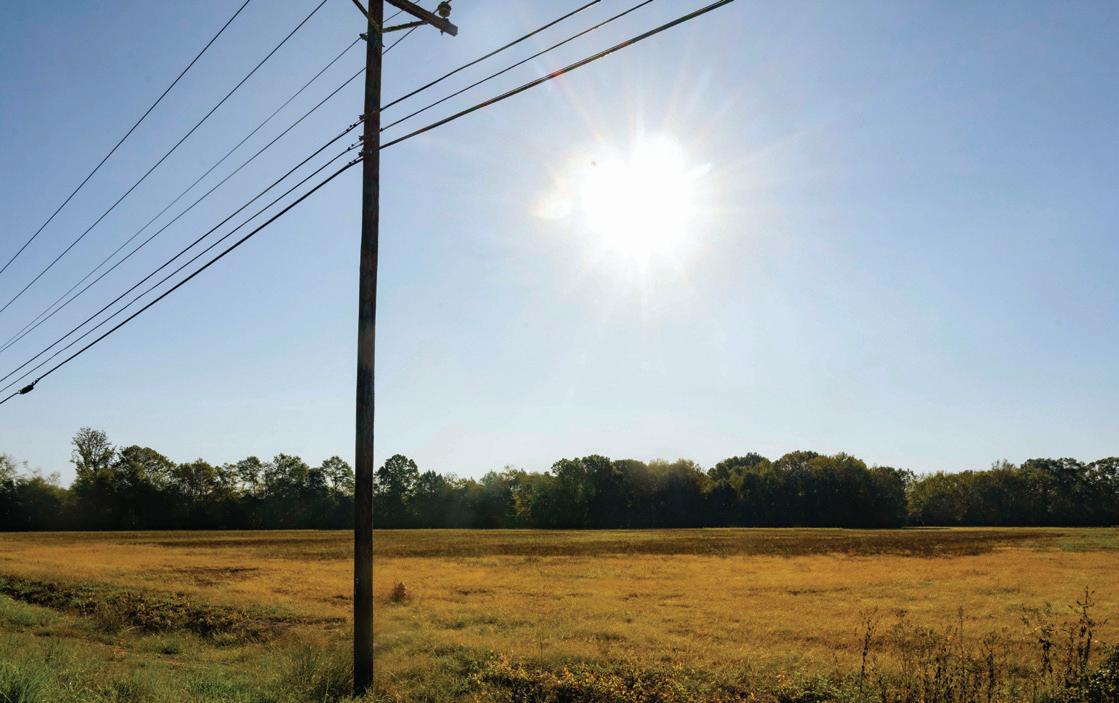

ADLAKHA
Sarah Adlakha hopes to win the primary against incumbent Republican Sen. Cindy Hyde-Smith next spring.
SEE PAGE 5

GEORGIA PREVIEW
Ole Miss matches up against Georgia in what could be its toughest game of the season.
SEE PAGE 9

College athletes challenge the NCAA in legal battles with hopes of changing current eligibility rules.
SEE PAGE 10
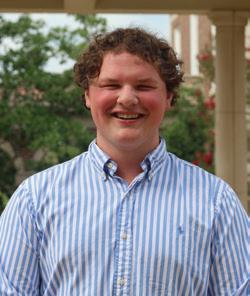
The university needs an immune system boost – free flu shots for students.
SEE PAGE 11
ing-room-only turnout gathered for two hours of public comment largely in opposition of the rezoning. The vote will go before the Lafayette County Board of Supervisors on Monday, Oct. 20.
Following the planning commission meeting, the “Save Taylor” website and Instagram page were launched to advocate against the rezoning. The Instagram account surpassed 300 followers in just a few weeks of activity. The posts spread awareness about meetings, actions that interested individuals should take and arguments in opposition to the rezoning, requesting donations to support community outreach and legal counsel.
McCurdy, owner of MR Construction, began discussions of building an asphalt plant in June. In July, he toured a similar facility in Columbia, Mo., and submitted an application to the Lafayette County Planning Department to rezone a 40-acre plot of land he owns on Mississippi Highway 328 for the facility.
The plant will be majority-owned by McCurdy in conjunction with local,

unnamed silent partners.
Many of the opponents of the rezoning plan have rallied around Falkner Farms. The family-owned business supplies pasture-raised eggs and grass-fed beef. Informed by agricultural experts, the owners worry about a drop in egg production and potential pasture, feed and water contamination from particulate matter discharged by the plant that could compromise the health benefits of their products, risking the
sustainability of their business.
Public meetings draw crowds of skeptics
Lafayette County Director of Development Services Joel Hollowell shared his evaluation of McCurdy’s application at the planning commission meeting, recommending that the property be rezoned. If the rezoning is approved
CAMERON LARKIN Digital
Editor
Turning Point USA announced via Instagram Wednesday that Vice President JD Vance and Charlie Kirk’s wife, Erika Kirk, will speak at the University of Mississippi on Wednesday, Oct. 29 as part of the “This is the Turning Point Tour.”
Before TPUSA Founder and CEO Charlie Kirk was killed at Utah Valley University on Sept. 10, he was scheduled to appear on the UM campus for “The American Comeback Tour” on Oct. 29.
“It is an honor for the university to welcome the nation’s Vice President and Mrs. Kirk to our campus,” UM News and Media Relations Director Jacob Batte said in a statement to The Daily Mississippian.
“As a public institution with a dynamic learning environment, the university is pleased for our students to have the opportunity to engage with Vice President Vance and Mrs. Kirk on issues of the day.”
Lesley Lachman, president of Ole Miss Turning Point USA, provided the following statement following the announcement that Vance and Erika Kirk would speak at UM:
“We are thrilled that the work of Charlie is going to go on and even grow,” Lachman said in a text to The Daily Mississippian.
“This announcement of Erika and Vice President Vance stepping in demonstrates the importance of Turning Point USA and its message. Ole Miss is a shining example of (c)onservative values while being an elite university in the U.S., so it is no wonder we will be amplifying it from Oxford.”
The event will take place in the Sandy and John Black Pavilion, with doors opening at 3 p.m. and speakers set to begin at 5 p.m. Event information can be found on the official TPUSA website.

Batte provided details about security protocol for the event in his statement.
“The safety of our campus community is always our top priority,” Batte said. “While we cannot share specific security measures for safety reasons, University Police are working closely with event organizers and public safety officials to uphold a secure campus environment.”
Rhodes Canfield, a senior sports and recreation administration major from San Diego, expressed his excitement about Vance coming to campus.
“I feel like after the death of Charlie (Kirk), it’s huge for Turning Point to get someone at such a high position to come and speak here,” Canfield said. “It really shows that the movement is and was about more than just Charlie — it’s about his ideas and the conservatism he brought to the table.”
Loki Swain, a sophomore multidisciplinary studies major and Oxford native,
does not agree with Vance or Erika Kirk politically but encourages people to go to the event and have “productive conversations.”
“While I strongly disagree with JD Vance and Erika Kirk on almost every political stance they uphold, they should be welcomed in coming to college campuses while having dialogue and debate and encouraging productive conversations,” Swain said.
Swain plans to attend the event.
“Whatever our differences, we all benefit when we treat each other with basic dignity and respect — just as the Ole Miss Creed says. I plan to go to the event to hear and learn about different viewpoints,” Swain said.
The Daily Mississippian reached out to the Office of the Vice President for comment but did not receive a response in time for publication.
Aidan Poniatowski and Noah Walters contributed reporting.
by the board of supervisors, McCurdy will proceed with submitting a site plan that must also be approved by the planning commission and board of supervisors. He must obtain a Large Construction Notice of Intent from the Mississippi Department of Environmental Quality (MDEQ) before he can begin construction on the facility.
If the rezoning is denied, McCurdy said he does not foresee his team appealing the decision and will dismiss plans for construction.
Hollowell reviews applications alongside the Planning Commission Review Committee in advance of public hearings. The committee consists of Hollowell, engineers, county consulting engineers, the planning commission chairman and county department heads.
“There’s been some criticism over how quickly (the planning commission) voted. I take a little pride in it — (the planning department) had them prepared … with all of the documentation, all of the evidence from both sides. … So, that’s all pushed out to the planning commission members well in advance,” Hollowell said in an interview with The Daily Mississippian.
He explained that McCurdy must request that the Highway 328 property be rezoned because the county zoning ordinance prohibits I-2 Heavy Industrial uses in A-1 Rural Districts.
“In the A-2 District, … there are no prohibitions, so everything is permitted by conditional use. So if this were an A-2 District
tion to rezone rural land to heavy industrial drew intense backlash.
Ley Falkner, owner of Falkner Farms, spoke at the planning commission meeting on how the asphalt plant could have adverse effects on his farm. He said that preserving grass health is vital to his feeding methods for cattle.
“Water contamination is at high risk. Heavy metals and particulate contamination can easily enter the waterways. I recommend that a facility such as this be located outside active farming areas,” Falkner said.
He urged the planning commission to vote against the rezoning and said the opening of an asphalt plant may put Falkner Farms out of business within a year.
To rezone land, the county zoning ordinance requires that there be a mistake in the original zoning or a change in the character of the neighborhood to such an extent as to justify reclassification, and that there is a public need for the rezoning.
On behalf of McCurdy, John Granberry, owner of engineering firm Granberry and Associates, argued before the planning commission that once-agricultural surrounding properties are now being developed or operated as commercial or light industrial businesses, signifying a change in the character of the neighborhood that warrants rezoning. Nearby infrastructure projects, he said, also indicate changes in the character of the neighborhood.
After the planning commission meeting, more than 150 Lafayette County residents gathered for a District 5 Town Hall meeting on Oct. 2 to voice their concerns over land development plans in the surrounding area, including
There’s a lot of facts, a lot of things being said that just aren’t true. And we try to try to educate people every chance we get, because it is scary … if you’re unsure or don’t know what we’re talking about.
-JW McCurdy Owner of MR Construction

new, well-paying jobs with salaries ranging from mid-$20s hourly to $150,000 (per) year,” the flyer said. “It will represent an investment of over $10 million into Lafayette County.”
McCurdy faced vocal criticism from attendees, many of whom reside outside District 5. They shared their grievances with Bynum and asked questions about plans for Magnolia Materials. Their concerns ranged from the proposed asphalt plant’s impact on the Yocona River and traffic congestion on adjacent roads to possible health effects of the plant’s operation.
The developer insisted on building understanding among the public regarding his plans for the asphalt plant.
“I’ve been told that I’m rich, and I’ve been accused of being in the supervisors’ pockets and a whole list of other things online,” McCurdy said. “ … So there’s a lot of facts, a lot of things being said that just aren’t true. And we try to try to educate people every chance we get, because it is scary … if you’re unsure or don’t know what we’re talking about.”
Bynum declined The Daily Mississippian’s request for an interview ahead of the upcoming board of supervisors meeting, indicating he preferred to engage more publicly.
congestion on state highways 328 and 7. Magnolia Materials, if constructed, would be located half a mile west of Highway 7.
“You start putting dump trucks that have less than ideal zero-to-60 (mph) acceleration and merging capabilities — it’s going to slow them down as people try to squeeze out onto that busy road. There will probably be a few more accidents,” Moore said via phone call.
Moore also spoke about the commercial and residential growth of Taylor in recent years. He hopes the board of supervisors will make a decision that mitigates road congestion from Taylor’s growth and the potential introduction of asphalt trucks.
“If they industrialize (Highway) 328 without mitigating that traffic and industrial feel, then (Taylor) will lose a ton of that flavor going forward. And the locals will lose that ‘Mayberry feeling’ they are so attached to,” Moore said.
McCurdy referenced the state’s upcoming $138 million investment to widen and improve Mississippi Highway 7 in an interview with The Daily Mississippian.
There are people that have lung problems that won’t be able to sit on their porch anymore,” Conrad said via phone call.
The Occupational Safety and Health Administration website indicates that exposure to asphalt fumes among workers causes side effects including headache, skin rash, sensitization, fatigue, reduced appetite, throat and eye irritation, cough and skin cancer. There are no studies that definitively prove asphalt fume exposure causes negative health effects among non-asphalt workers. There is already one asphalt plant located two miles from the Oxford Courthouse Square. Lehman-Roberts has been operating off North Lamar Boulevard for 32 years. There are 597 homes within one mile of that plant. There are fewer than 100 homes within a mile of the proposed Magnolia Materials site.
A presentation on Magnolia Materials shared with The Daily Mississippian states that an open records request was submitted to the county, the City of Oxford and the MDEQ seeking any complaints ever submitted regarding the Lehman-Roberts plant. The presentation said that each entity produced no complaints.
instead of an A-1 District, there wouldn’t be this concern over rezoning. (McCurdy) would just be here simply asking for a conditional use permit,” Hollowell said.
The board of supervisors has authority over road maintenance and construction, levying taxes, appropriating budget funds and overseeing the planning department. The planning commission makes recommendations to the board of supervisors, adhering to the county’s comprehensive plan and zoning ordinance.
Hollowell provides his recommendations on rezoning matters to the planning commission and informs the board of supervisors about upcoming planning issues.
Zoning provides predictability for property owners, regulating what can be built in certain areas. Perceived as an unpredictable proposal by many in opposition to the rezoning, the stark transi-
the proposed asphalt plant. The event was held at the Paris Baptist Church Fellowship Hall in Paris, Miss., and was moderated by District 5 Supervisor Greg Bynum.
At the town hall meeting, McCurdy took to the podium to answer attendees’ questions about the proposed plant. He also distributed handouts created by a team assembled for the Magnolia Materials project with answers to frequently asked questions.
The flyer stated that the asphalt plant would not pose environmental or community safety hazards, highlighting the modern filtering and emissions prevention technologies the facility will have. It also detailed how Lafayette County would benefit from the plant, indicating it would produce approximately $37,000 in county tax revenue annually.
“Magnolia Materials will create over a $1 million payroll of
“I prefer to engage and discuss in an open forum, which I have done, especially given the charged nature of this particular issue,” Bynum said via email. “As I stated at the town hall, I’ll be making a final decision on this matter based on the evidence produced during the public hearing on Oct. 20.”
The four other district supervisors — Brent Larson, John Morgan, Tim Gordon and Scott Allen — did not respond to The Daily Mississippian’s requests for comment.
Taylor residents express concern
David Moore, also in attendance at the town hall meeting, owns Offbeat in General grocery store in Taylor. He lives and works approximately three miles from the proposed plant site.
In an interview following the town hall meeting, Moore discussed his concerns for traffic
“The biggest benefit is that we’re on a state highway. So the road up here is owned by the state of Mississippi and maintained by the state of Mississippi, so the county has no obligation to repair potholes, repave, fix bad spots or replace pipes in the road,” McCurdy said. “Our proximity to what will be the new four-lane highway is another added benefit, which is another state-owned road. So these loads of trucks don’t have to drive on our county roads that we all have to pave and fix to get where they’re going.”
Cindy Conrad attended the town hall meeting, as well. She lives 1.5 miles from the site of the proposed plant and suffers from lung diseases that impact her breathing.
She worries that emissions from the asphalt plant could impact her quality of life long term, given that the health effects of exposure to hot mix asphalt emissions are inconclusive.
“The nanoparticles are going to float around the area, and who knows how far they really go. There’s also a smell with asphalt, and one of my greatest joys in life is sitting on my porch. …
McCurdy said he does not believe that the town of Taylor will be affected in any way by the asphalt plant.
While many Lafayette County residents have raised concerns about the potential effects of the asphalt plant on businesses and on public and environmental health, McCurdy stressed the various benefits that Magnolia Materials would provide the community. Lafayette County and private contractors building and paving roads would be the largest purchasers of asphalt. McCurdy said the addition of a locally owned asphalt plant would reduce project costs and allow for faster project completion.
“Right now, the (Lehman-Roberts) plant that we have is owned by … a publicly traded company in California, so all of our local dollars are going to a company in California,” McCurdy said. The town hall flyer highlighted that Lafayette County currently pays $112 per ton for asphalt, 25% more than the state average of
$89.60 per ton, according to Mississippi Department of Transportation hot and cold asphalt pricing. Comparatively, Hinds County pays $76 per ton for asphalt, Harrison County pays $93 per ton and Lincoln County pays $82.50 per ton.
McCurdy also emphasized the growing need for asphalt in the community, given Oxford’s boom in development and population size. Roughly 60,000 people currently reside in Lafayette County; 90,000 residents are projected to live in the county by 2030.
“You know the rate at which Oxford and Lafayette County are growing, and we have three concrete plants and one asphalt plant, and the three-day wait to get concrete, and concrete lasts forever, and asphalt lasts about 15 years,” McCurdy said.
Magnolia Materials would also become a positive contributor to the county’s economy and a tax revenue source for the county and local school systems.
With regard to the environmental effects of the plant, McCurdy noted that the U.S. Environmental Protection Agency delisted hot mix asphalt plants as major sources of air pollution in 2002. He said that asphalt plants have reached over a 90% containment factor after 23 years of advancements in containment technologies.
“This plant will have entire buildings that are nothing but filters (baghouses), and the final emission will be water vapor. In fact, the total annual emissions created by the two residential fireplaces over an average year of usage,” the town hall flyer said.
“An industry like this doesn’t go through eight years of Barack Obama and four years of Joe Biden without coming out on the other end as one of the most highly regulated industries in the nation.”
Up to 35% of hot mix asphalt can be reclaimed asphalt, McCurdy said, calling it one of the most recycled products in the construction business.
“By rule of thumb, asphalt is
made up of 30% reclaimed asphalt, 65% sand and gravel and 5% liquid asphalt. There’s no water in asphalt. So, what you see coming out of the top of the burner is actually the vapor of the burner cooking all of the moisture out. So the only contaminant, so to say, would be the liquid asphalt, and it’s stored in an elevated double line tank. The bottom of the tank would be an additional two feet off (the ground,)” McCurdy said.
The proposed site sits in a floodplain of the Yocona River bordering the property. At the town hall meeting, McCurdy said he plans to construct the facility 4.5 feet above the ground so that it would no longer sit in the floodplain, addressing concerns about potential water pollution from floods.
Two neighboring families wrote letters of support for the rezoning — Rickey and Melissa Harwell and Andy and Charlie Fortner.
McCurdy declined to answer how he and his team are preparing for the board of supervisors meeting on Oct. 20.
Falkners look to the future
Falkner Farms supplies organic beef and eggs to local grocery stores and restaurants, including Chicory Market and Tarasque and Kingswood restaurants in Oxford and Taylor’s Offbeat in General store and GRIT Restaurant.
“It started as our small hobby farm. We could see what we could do with some chickens and stuff like that, but that was 2013, and it has taken off since then. (The COVID-19 pandemic) really helped us as far as breaking the food chain. It allowed us to be able to provide local food when (people) couldn’t get it,” Reed Falkner said.
Today, the farm is home to more than 1,000 chickens and more than 50 cows.
Five years ago, Reed Falkner left his full-time teaching position to take over farming

THE DAILY MISSISSIPPIAN EDITORIAL staff
CLAY HALE editor in chief dmeditor@gmail.com
RAEGAN SETTLE managing editor dmmanaging@gmail.com
SYDNEY STEPP copy chief thedmcopy@gmail.com
CAMERON LARKIN digital editor dmdigitaleditor@gmail.com
AIDAN PONIATOWSKI news editor thedmnews@gmail.com
NOAH WALTERS assistant news editor thedmnews@gmail.com
operations. Raising his daughters on the farm is his favorite part of the job, he said.
“My wife and I sat down and picked this. It was kind of chosen for us. There was one pro, and that is to follow your dream. That was our whole purpose — to raise our girls on this farm,” Reed Falkner said. “We have four girls, raise them here, bring them up in this lifestyle, teach them how we think. … It’s just family-oriented.”
Reed Falkner first heard about the proposed rezoning hearing on Sept. 5 when he pulled out of his driveway and saw a “Notice of Zoning Hearing” yard sign in front of McCurdy’s property.
The Falkners have consulted numerous experts in agriculture, including Understanding Ag, LLC partners Allen Williams, a former faculty member at Louisiana Tech University and Mississippi State University, and Gabe Brown, a pioneer of the regenerative soil health movement.
Ken Macklin, professor and head of the Mississippi State University Department of Poultry Science, addressed a letter to Ley Falkner dated Sept. 15 expressing concerns about the potential impacts of the proposed asphalt plant on Falkner Farms. Specifically, he called attention to noise and air quality.
“While some of the specific effects of emissions from the plant are uncertain, there are several well-established risks that deserve serious consideration,” Macklin said in his letter. “ … Poultry are highly sensitive to sudden or continuous loud sounds, and research has shown that elevated noise levels can directly reduce egg production. It would not be surprising to see a decrease in egg yield of 1015% once the plant is in operation.”
Regarding air quality, Macklin said that dust and particles from petroleum byproducts could settle onto pastures, feed and water sources.
“The potential for contamination raises legitimate concerns about the animal’s well-being, as well as the long-term quality of your pastureland,” Macklin said. “Selecting a more suitable location would allow the plant to serve its purpose without jeopardizing local farms, food safety and rural livelihoods.”
Because many customers purchase Falkner Farms products for health benefits, Reed Falkner said he aims to provide the cleanest products possible. He worries that contamination from particulate matter landing on blades of grass and being absorbed by the soil may compromise this goal.
While McCurdy plans to build the asphalt plant 4.5 feet off the

ground to escape the Yocona River floodplain, Reed Falkner worries that flooding into pastures could be exacerbated by the plant’s location and design.
The Magnolia Materials presentation claims that the plant’s design will include stormwater retention and detention features to properly manage drainage. Adherence to state and local standards will be enforced by the county planner, MDEQ and the county engineer.
“This plant, like any new construction, will be required to be elevated out of the flood plain, and claims that the plant will be sitting in the flood plain and just flood out with the adjacent cropland during rains are really not worthy of response,” the Magnolia Materials presentation said.
No evaluation of the Magnolia Materials site plan by any government agency or official has occurred. McCurdy said that the site’s planning is grounded in MDEQ and U.S. Army Corps of Engineers (USACE) regulations and Best Management Practices.
Reed Falkner trusts the MDEQ and the USACE to carefully assess whether his concerns for shifted watershed placement are valid and whether flood conditions will be worsened by the plant’s location.
“We have nothing against (McCurdy) and (McCurdy) doing asphalt. … Our problem with this scenario is just the location, with (there) being a river, with (the plant) being right across
from us — an established farm,” Reed Falkner said. “If they want asphalt, we’re for that. They want competition for the city. We just think the placement, the location, is the wrong one. That’s kind of what our fight is.” Reed Falkner and his wife Elizabeth are months away from finishing construction on their dream home. The farmhouse sits on a hill overlooking a cow pasture. News that an asphalt plant could be built across the road dampened their vision for their new home. Diminished property value for the homes in close proximity to the industrial facility could become a result, he said. Distance from industrial sites typically has a statistically significant negative effect on residential property value. If the board of supervisors approves the rezoning, the Falkners could appeal the decision to the Lafayette County Circuit Court. Reed Falkner said he is unsure whether adequate funds will be available to pursue litigation.
“The main thing is the precedent that would be set. You know, we’re saying that you can come in here and take away local farms that provide local food for your own community, to put in … heavy industrial (operations). … Yes, we would have our own problems, but the bigger message here is nobody, no farm is safe.”
CONTACT THE NEWS DESK AT thedmnews@gmail.com
JAYLYNN CONNER arts and culture editor thedmfeatures@gmail.com
JESSICA JOHNSON assistant arts and culture editor thedmfeatures@gmail.com
RUSS EDDINS sports editor thedmsports@gmail.com
NATE DONOHUE assistant sports editor thedmsports@gmail.com
KADIN COLLIER opinion editor thedmopinion@gmail.com
OLIVIA CANGELOSI photo editor thedmphotos@gmail.com
JOURNEY GLOVER assistant photo editor thedmphotos@gmail.com
MADELYNN LIBERTO design editor thedmdesign@gmail.com
FARIDA BELAL assistant design editor thedmdesign@gmail.com
MARY EVANS multimedia coordinator dailymissmedia@gmail.com
AVERY THOMAS social media manager thedmsocialmedia@gmail.com
CADENCE MANNING assistant social media manager thedmsocialmedia@gmail.com
S. Gale denley student media center
LARZ ROBERTS Director of Student Media
DENNIS MOORE Editorial Director

Increased Calorie Burn
Detoxification
Lower Blood Pressure
Anti-Aging & Skin Rejuvenation
Improved Circulation
Weight Loss








NOAH WALTERS Assistant News Editor
Next spring, Republican primary voters will find an alternative to U.S. Sen. Cindy Hyde-Smith on the ballot. Dr. Sarah Adlakha, a physician, author and real estate developer, is mounting a primary challenge to the incumbent.
Adlakha says HydeSmith represents the “ineffectiveness” of Congress.
“As far as ineffectiveness with our senators and Cindy Hyde-Smith in particular, she’s consistently ranked. There’s a ranking called the Center for Effective (Lawmaking). They do rankings every year on how effective senators are,” Adlakha said.
The Center for Effective Lawmaking is an independent collaboration between the University of Virginia and Vanderbilt University intended to promote productive legislation and to inform the efforts of good governance partners. Using the Library of Congress to track all legislation, the organization ranks elected officials in the House, Senate and certain state legislatures based on their contributions.
Hyde-Smith is ranked 46th out of the 49 Republican Senators on legislative effectiveness in the rankings of the Center for Effective Lawmaking.
“(Hyde-Smith) is consistently ranked in the bottom five of Republican senators. In 2023, she was ranked dead last,” Adlakha said. “You can see that in her record. She hasn’t written and passed one substantive piece of legislation since she’s been there.”
Hyde-Smith was appointed to her seat in 2018 by Mississippi Governor Phil Bryant when U.S. Senator Thad Cochran resigned due to health issues. Hyde-Smith has since won the 2018 special election to fulfill the rest of Cochran’s term, as well as the 2020 election for her seat.
The Center for Effective Lawmaking shows that while Hyde-Smith has sponsored 18 substantive bills for the current 118th Congress, only one went to committee and one went beyond that, with zero of her bills becoming laws. A bill is considered “substantive” if it is “neither Commemorative nor Substantive and Significant,” meaning that it is neither symbolic nor significant enough to be considered a notable vote by outlets like Congressional Quarterly Weekly and Project Vote Smart.
The Daily Mississippian reached out to Hyde-Smith’s Oxford office, but a representative declined to comment.
Primarying an incumbent
In Adlakha’s assessment, Hyde-Smith’s inefficiency in listening to her constituents’ concerns has created a weak point for her.
“A pretty regular message
that I’ve gotten from a lot of people is there’s just not a lot going on,” Adlakha said, referring to conversations she has had with potential Republican primary voters across Mississippi. “I think one of the biggest complaints most people have that I talked to when I asked about our legislators, and what do (they) think are some of the deficiencies, is (that) nobody can ever reach her. She doesn’t do town halls. She doesn’t talk to her constituents.”
This perceived opening has resulted in a different type of campaign from Adlakha — that she thinks she can win, regardless of institutional support.
“I absolutely think I have a chance to win because getting out in front of people and getting out and listening to what is going on in people’s everyday lives … it’s difficult for one person to cover. I mean, geographically, we have a pretty big state, and so it’s hard to get to all these places, but it’s worth it,” Adlakha said. “And whether or not I have someone’s endorsement, I don’t think endorsements go as far as they used to in politics.”
President Donald Trump has endorsed Hyde-Smith for her 2026 re-election bid for Senate.
In terms of listening to constituent concerns, Adlakha pointed to routine agriculture bills, which do not require much legislative innovation, that Hyde-Smith was responsible for passing in the Senate but did not.
“So, big committees for her, she’s on the agriculture committee, right? The farm bill hasn’t been passed in … seven years. They’re supposed to pass the farm bill every five years, so it’s two years overdue,” Adlakha said.
Politically, Adlakha holds popular Republican views, considering herself a constitutionalist and “America First” supporter, not unlike HydeSmith. Adlakha is a proponent of fiscal conservatism and focusing on domestic issues.
“I’m a fiscal hawk. I’m definitely for stricter fiscal policies. I’m definitely an America First girl,” Adlakha said. “Our senators are guilty … of funding overseas conflicts, overseas aid, when we have plenty of need here in our own country. And so when I look at fiscal policy, I think that kind of ties into all policies. I mean, whether we’re talking about health care, immigration, illegal immigration.”
Immigration, in particular, is a key concern of Adlakha’s.
“If you look at the I-10 corridor coming through Mississippi, from Louisiana to Alabama and the amount of human trafficking, sex trafficking, drug trafficking that goes through that corridor and then … winds its way up into
all of our highways and interstates into our state. We might as well be a border state, because there’s so much going on right now,” Adlakha said. “Being able to not only secure that border, because there’s criminals coming across the border, but even if they’re not criminals in the sense of violent crimes, we have people coming in here illegally who are using our resources.”
Adlakha also believes that fixing government inefficiency in the Senate does not just involve effective legislation, but also empowers state legislatures.
“Whenever we’re talking about federal laws, the Constitution gives us liberties, right? It gives us individual liberties. It’s not there to provide overreach or limitations in what we can do, and whatever is not included in the Constitution, according to the 10th Amendment, goes to the people in the states, right?” Adlakha said. “I’m a constitutionalist by nature, so I’m definitely for smaller federal government, and I believe that we need more states’ rights rather than federal interference in our lives.”
In Adlakha’s words, part of this “overreach” involves government subsidies, which she opposes.
“So there’s a lot of things that are going on right now in the federal government that they have their hands in. … They’re subsidizing certain industries, certain people, certain groups and certain companies, kind of creating a monopoly effect and taking that power away from the states,” Adlakha said.
Adlakha supports term limits for congresspeople, which she thinks will address some of the government inefficiency.
“I’m not looking to become a career politician. I’m just not looking to play this game, this political game. I have a very clear reason for why I’m running. I have very clear ideas of what I’d like to do. And one of the things that’s really important to me is term limits,” Adlakha said. “And I think you’d see a far different country and a far different party, probably both parties, if we had term limits, where people weren’t just going in there and saying, ‘Okay, who do I need to appease? Who do I need to endorse? Whose pocket do I need to get into to fund my next campaign?’”
The outsider
Adding term limits would attract those not looking to make a career out of politics, but those aiming to make a change, in Adlakha’s view.
“I think you’d see people who (are) not career politicians stepping into office more frequently, just like President Trump, right? I mean, this is a man who came from the real world, built

businesses, created jobs. He wasn’t a career politician, and he stepped in, and he’s really shaken things up and I think that’s great. I think that that’s what we need,” Adlakha said. “We need people to come in there and say, ‘Okay, the country’s failing.’ You know, our national debt is almost, it’s about to pass $38 trillion. We’re doing something really wrong, and nobody’s doing anything to stop it.”
Adlakha’s real life experiences are what she hopes to bring to Washington.
“I have, like most people in Mississippi, been required to live within my means, right? I don’t come from the government. I don’t think our leaders in Washington understand what a budget is or how to balance a budget. So I’ve spent my life not only balancing my family’s budget, but also running businesses, working on real estate developments. … In the real world, I have come under strict deadlines. … I’ve never had to miss a payroll. I have always figured out how to get my employees paid,” Adlakha said.
Her hope is that students will seize the opportunity to vote in the primaries in order to make their voices heard early in the election cycle, particularly bearing in mind that the Republicans have an advantage in the state.
“One of our campaign messages is getting younger students out to vote. … I think when you’re talking about changes that are being made in legislation today, a lot of times you’re not going to see the effects of that for many years. … You might only be 18, 19, 20 years old, (but) it’s going to have a big impact on the kind of world you’re living in in 10, 20, 30 years,” Adlakha
said. “Especially in a primary in a state like Mississippi that is more than likely going to elect a Republican senator in 2026, you need to be looking at which Republican senator you want in that spot.” Adlakha wants students to understand the primary vote as a question of representation. She challenges young voters to look at Hyde-Smith’s record when considering who they want to represent them.
“It’s going to be important for the younger generation to see that and to say, ‘Who do I realistically want to be my senator? Who do I want representing me?’” Adlakha said. “And looking at the policies, looking at Cindy HydeSmith’s record, what are the things that she voted on, what are the things that she’s done? What are the things that have enhanced our lives here in Mississippi? I personally think there aren’t too many that you’re going to find.”
Editor’s note: Prepping for Primaries is a series featuring candidates for the 2026 Senate election in Mississippi. Vidya Adlakha, daughter of Sarah Adlakha, is an opinion writer for The Daily Mississippian. As part of the Prepping for Primaries series, it is the duty of The Daily Mississippian to offer a platform for all candidates. Vidya Adlakha’s views and connection to Sarah Adlakha are in no way reflected in this article, nor do they represent the views and opinions of The Daily Mississippian. Interviews with other candidates will be featured in future editions.
CHANCE MARLOWE News Staff Writer
University of Mississippi faculty and staff members marched in the Pink on Parade Walk to show support for breast cancer prevention and screening on Wednesday. Chancellor Glenn Boyce met participants of the march in front of the Lyceum to begin a walk around campus.
The event was hosted by the Red, Blue and Well committee, with the goal of raising awareness and promoting an active lifestyle.
Red, Blue and Well is the university’s employee wellness program.
Victoria Hughes, an executive assistant in the Office of the Provost, was one of the facul-
ty members leading this event.
“I worked with the Red, Blue and Well committee to pick out a date, and they really helped push out the communication for the event,” Hughes said.
The 20-minute walk took the group from the front of the Lyceum, past the Phi Mu fountain, then to Guyton Hall and ended at the Lyceum entrance that faces the J.D. Williams Library.
Danielle Ammeter, associate dean for undergraduate programs and an instructional associate professor of management and business, participated in the walk.
“It’s important. We want to support the community, and we’ve got folks in the School of Business (Administration) who are breast
cancer survivors,” Ammeter said.
This event allowed staff members who do not normally cross paths to engage in conversation and deepen professional relationships.
Sital Sigh, management instructor and project manager for the UM School of Business Administration, also believes the walk fostered community.
“I think it’s a great way to get to know people in other departments and to be a part of the community,” Sigh said.

TÉA MATHIAS News Staff Writer
The Center for Practical Ethics hosted a discussion regarding Christopher Columbus on Monday, Oct. 13, at the Jan and Lawrence Farrington Gallery in Bryant Hall.
Associate Professor of Anthropology Marcos Mendoza and Associate Professor of Colonial Latin American History Jesse Cromwell shared their perspectives on the discourse surrounding Columbus Day, while students gathered to hear and discuss whether Columbus’ legacy should be commemorated.
Columbus is historically significant for being credited as the man who discovered the Americas in the 1400s; however, many take issue with how he treated the Indigenous people of the time.
The event was hosted by Nathan Oakes, director of education and student programs at the Center for Practical Ethics, who guided a question-and-answer session between the two professors.
Oakes started the discussion by asking about the professors’ background and how that may shape their perspective.
For Cromwell, the idea of commemoration is a dicey one, especially given his background as a historian.
“I think historians in general are very wary of commemoration, in that commemoration is rarely history,” Cromwell said. “History is the evidence-based interpretation of tasks.”
Cromwell added that
commemoration often simplifies a person’s legacy.
“Commemoration tends to sand down the intricacies of a person, people or even an event,” Cromwell said. “This generation, in many ways, tends to sort of sanitize, sanctify or villainize. There is a lot about Columbus that is deeply problematic by our standards.”
Mendoza responded by adding his perspective, emphasizing that his expertise is quite different from Cromwell’s.
“I believe the act of commemoration involves the process of conflicts, friction and multi-interpretations,” Mendoza said. “But what we really need to understand is the slight demonic roots and urge to contest state merit about certain people or events.”
For Mendoza, the association Columbus has with systematic enslavement and killings is too big to ignore.
“I want to take a more corporate perspective on Columbus, thinking about some of the historical associations he has with the Caribbean, slavery, forced labor and genocide,” Mendoza said.
Oakes followed their responses by asking a more fundamental and topical question — whether the two believe the celebration of Columbus day is “okay.”
Mendoza believes that the day could be better spent honoring someone else.
“My personal opinion is that I think we can recognize people that are more worthy,” Mendoza said.
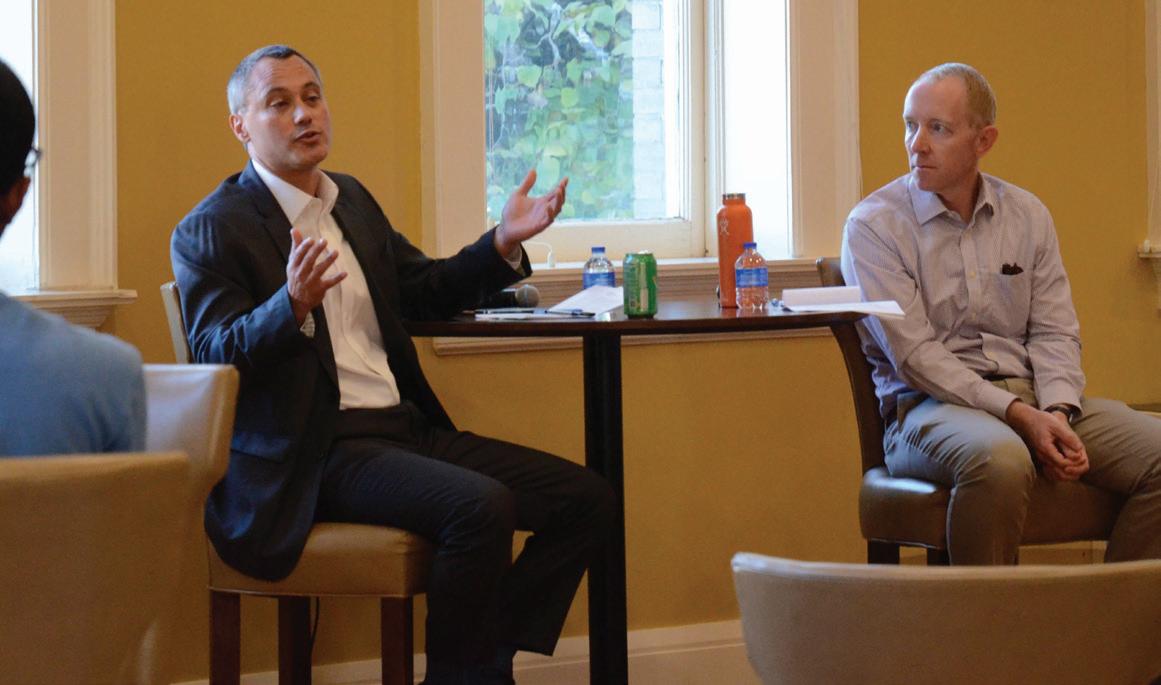
Cromwell added that Columbus’ past is one that makes his legacy difficult to honor.
“We don’t need this kind of name on one of our holidays,” Cromwell said. “In addition to genocide, kidnapping, murder of the Indigenous people, violence and even rape, it is not a traditional thing we would want to celebrate.”
The discussion encouraged students to reflect on what our society chooses to celebrate and honor. Both speakers recognized and stated that our society needs to “do better” when it comes to situations and circumstances like these.
This message struck many viewers, as they left considering different points of view on Columbus Day.
“I chose to attend the event because I wanted to gather a different point of view on Columbus Day,” Sadie Rosengrant, a sophomore journalism major, said. “I did learn a lot from the speakers, and I think there is a lot more to this day than what is perceived.”
The event came after President Donald Trump announced via official proclamation on Oct. 9 that Columbus Day would be reinstated as a federal holiday, following a shift by cities, states and educational institutions to celebrate “Indigenous Peoples’ Day.”
“Today our (n)ation honors the legendary Christopher Columbus — the original American hero, a giant of Western civilization, and one of the most gallant and visionary men to ever walk the face of the earth,” Trump said. “This Columbus Day, we honor his life with reverence and gratitude, and we pledge to reclaim his extraordinary legacy of faith, courage, perseverance and virtue from the left-wing arsonists who have sought to destroy his name and dishonor his memory.”
For Oakes, strong feelings make this discussion important.
“The goal was just to facilitate conversation on something that a lot of people feel strongly about with some faculty who have some context,” Oakes said.

SARAH FENTON Sports Staff Writer
Ole Miss Athletics announced Marlon Bailey as the new associate athletics director for sports psychology last month.
“I inherited a program built by a passionate clinician who cared deeply about the athletes,” Bailey said. “I share that same passion, but I’ve also brought my own ideas and ways of doing things. I’ve been excited to implement new approaches that reflect my background and skills. We’ve already started introducing some changes that I think will make our program stronger and more holistic.”
The core of Bailey’s job is to serve athletes. Bailey and his team provide mental health and performance services to student-athletes in an attempt to create a culture where athletes have the tools to succeed both on and off the field.
Bailey earned his bachelor’s degree in psychology, master’s degree of science in social work and doctorate in counseling psychology at the University of Texas. Before coming to Oxford, he worked at Vanderbilt University, as well as Expansive Insight, a private practice that specializes in a variety of mental health measures.
Ole Miss has steadily developed a strong support network within sports psychology. Including Bailey, three clinicians are currently on staff, and another will begin work soon. All are trained mental health practitioners who are also pursuing performance certifications, which
allows the team to work in clinical and athletic performance settings.
Student-athletes face stressors like performance expectations, academics, social pressures and family responsibilities. Sports psychology clinicians lead appointments, performance sessions and annual mental health screening with every student-athlete to improve their ability to handle daily stressors.
Though Bailey and his team almost always work directly with student-athletes, they also consult with coaches and staff to optimize team performance and overall well-being within each program.
Bailey hopes to build on what is already in place while expanding resources and adding approaches to better serve student-athletes in every sport. He has been working in Oxford for only a few weeks, but he has already noticed stark differences between the University of Mississippi and other universities.
“I’ve worked at bigger and smaller places, but this place has a unique energy. People here are proud that it’s like nowhere else,” Bailey said.
He highlighted the athletic culture in particular.
“Athletically, Ole Miss consistently punches above its weight. For a school of this size, in this location, the success is impressive,” Bailey said. “That ‘never count us out’ mentality really resonates with me personally. It’s part of why I love being here.”
Another key aspect of Bailey’s approach is understanding that no two teams are the same. With more than a dozen varsity

programs at Ole Miss, each with its own identity and dynamics, his team focuses on addressing issues on a case-by-case basis.
“It’s all about collaboration,” Bailey said. “We don’t come in and dictate, we work with coaches and athletes to support what they’re already doing. Sometimes that means helping to create a new skill or tool. Other times, it’s helping athletes navigate relationships with teammates or coaches.”
Bailey emphasized that every team has its own culture, and his staff adapts to those unique environments while reinforcing shared goals of growth and performance.
“I focus on meeting athletes where they are, while being fully myself,” Bailey said. “There’s a clinical concept called ‘use of self,’ which means my presence and authenticity are tools in the therapeutic process.”
For Bailey, human-to-human connection with his clients is essential to his practice. He sees the student-athletes he serves not as clients, but as friends.
“A big part of it is just being a normal human. Not every conversation I have is about mental health or even sports,” Bailey said. “When athletes see me as a full person, not just ‘the mental health guy,’ it lowers barriers. Mental health
shouldn’t be treated differently than anything else. Some people naturally experience less emotional stress — that’s great for them, but their experience isn’t universal. We work to push back against that ‘just tough it out’ narrative.” Bailey aims to make Ole Miss the model for how sports psychology should look — clinicians trained in both clinical care and performance, operating in an environment where mental health checkins are viewed as indispensable.
CONTACT THE SPORTS DESK AT thedmsports@gmail.com
HALLIE WOOLEY
A&C Staff Writer
Rose Bridges, an instructor in music, may be at the University of Mississippi only for a year-long stint, but she brings a lifetime of musical knowledge to campus in topics ranging from music history to anime. Bridges was hired at UM for a limited time to fill in for a professor while he is away conducting research. She previously taught music history courses
on the Western classical tradition, popular music, film music and contemporary Japanese music at the University of Texas at Austin, the University of Florida, Towson University and Eastern Washington University.
“Once I was at UT Austin, I got to be a (teaching assistant) for classes like film music and even a course on The Beatles,” Bridges said. “I got to start putting my research interests into my teaching while being a TA for a class on hip-hop because we were given

the opportunity to create a lesson based on our specific interests. I talked about Japanese hip-hop and hip-hop used in anime.”
Now at UM, she is teaching MUS 101: Introduction to Music Literature and MUS 520: Introduction to Music Research. Next semester, she will teach two undergraduate courses, MUS 302: History of Music II and MUS 101.
As a musicologist, Bridges focuses her research on film music, anime music, Japanese music, opera and popular music studies.
She is considered one of the leading scholars on music in Japanese anime, with published articles, books and dissertations examining gender, sexuality, race and religion in anime soundtracks.
Bridges has been published by Anime News Network, writing about anime outside of the topic of music. She also is the author of the 2017 book “33 1/3 Japan: Yoko Kanno’s Cowboy Bebop Soundtrack” and has published articles or chapters on anime music in the 2021 edition of the journal “Mechademia,” the 2024 book “The Palgrave Handbook of Music and Sound in Japanese Animation” and the forthcoming “Oxford Handbook of Music in Television and Routledge Companion to LGBTQ+ Media.”
Working on “33 1/3 Japan: Yoko Kanno’s Cowboy Bebop Soundtrack” was Bridges’ start in examining top-
ics such as gender and sexuality in anime soundtracks.
“There was a lot to analyze about the music from (Cowboy Bebop), and so I pivoted to focus on gender and sexuality because I was sort of familiar with feminists and queer theory in music,” Bridges said. “There are a lot of things about identity that are looked at through a Western and American lens, but media from places like Japan doesn’t really translate that. So you kind of have to do that work yourself and immerse yourself in what that culture thinks about those topics.”
As she is currently working on a book that expands that research to examine how anime music constructs race, nationality and religion, Bridges is still figuring out how to balance being a professor with her writing and research. Despite her own workload, she takes time to encourage students to reach their goals.
“I try to encourage them to actively listen to music for fun, and they don’t always have to do it in a music theory way,” Bridges said. “I want them to spend time with music and engage with it in a way that makes them recognize that it draws them in and makes them enjoy it. Every way that we engage with music is valuable.”
Bridges first became interested in anime while attending high school, when it started to gain popularity in the United
States during the early 2000s. Once in college, a close friend introduced her to an anime called “Puella Magi Madoka Magica.” “I got really interested in watching anime and focusing on the music in it because it was so different from western cartoons,” Bridges said. “And then, I realized nobody was writing about it.” Bridges, though likely only at the university for a short while, has enjoyed her time at UM.
“I really enjoy the school spirit of being on this campus,” Bridges said. “Other than being in Texas, I hadn’t ever been to a school really focused on sports. I don’t care for sports, but I enjoy getting to support the marching band. A lot of the music faculty got to attend the game against LSU, and getting to watch my students that are in the marching band was really special.” She already feels the impact of her time here.
“I feel like my experience here is really helping me grow as a professor, and I have been mentored by a lot of the other professors in the department of music,” Bridges said. “I feel really nurtured and I feel like I am making my classes better because of the support I am receiving, and my students seem to be really enthusiastic.”
JESSICA JOHNSON Assistant A&C Editor
PinkPantheress released her second remix mixtape “Fancy Some More?” on Friday, and the mixtape features remixes of the nine tracks off of PinkPantheress’ mixtape “Fancy That,” which was released earlier
this year and is shortlisted for the 2025 Mercury Prize.
PinkPantheress recruited Kylie Minogue, Anitta, Kaytranada and SEVENTEEN, among others, to collaborate on the 22 tracks of “Fancy Some More?” The first half of the mixtape contains features from vocal artists, while the latter half contains traditional

remixes done by various DJs.
Remix albums can be a hard territory for some artists to navigate, as you have to balance making a previously existing track sound familiar, yet innovative. In PinkPantheress’ case, her dance and electronic music is already full of deeply creative samples, making it prime real estate to manipulate.
The remix of “Illegal” by British DJ Nia Archives stays true to the original song but puts a faster, more danceable beat on the track. The addition of United Kingdom garage drums ties together the remix by putting a signature PinkPantheress touch on the track.
The “Stateside” remix with Swedish singer and rapper Bladee is a bright spot on the collection in terms of imagination. It takes on a much more hyperpop direction than the original rendition, reminiscent of an A.G. Cook track.
TAYLOR HILL A&C Staff Writer
Vaught-Hemingway Stadium is known for hosting game-day traditions that start both in the stands and on the field. These moments for fans are queued by songs that play over the loud speakers and football plays concocted by Lane Kiffin himself.
Here are some of the favorite plays that Ole Miss fans have on football game days: Rebels’ favorite stadium tunes
During games in the Vaught, songs including “Love Is Gone” by Chris Willis and David Guetta, “Friends in Low Places” by Garth Brooks, “Revival” by Zach Bryan and “SkeeYee” by Sexyy Red are featured for players and fans. These songs accompany signature game-day moments and are keyed up after good and bad football plays.
“Love Is Gone” has become a staple in Ole Miss Athletics for a variety of sports. Students pump their fists and wave their phone flashlights to the beat of the song.
“My favorite song they played during the game is ‘Love Is Gone’ because they play it in football season and then the fifth inning of baseball season, as well,” Audrey Shelcon, a senior finance and real estate major, said.
Bralen Williams is a senior exercise science major from Oxford and has experienced
years of music at the Vaught.
“One of my favorite songs that’s played at the Vaught on game day is ‘Friends in Low Places’ because it’s easy to sing along to,” Williams said. “They always put the fans on the jumbotron enjoying the game, and the song gives a Southern vibe that I feel like fits Ole Miss well.”
Memorable football plays
Songs are not the only things playing to keep Rebels coming back to the stadium. Ole Miss Football has executed many attention-drawing plays in recent years.
The Rebels beat LSU 5549 at Vaught-Hemingway on Sept. 30, 2023. Here, they tallied the most points scored against an AP-ranked opponent in Ole Miss history.
With five seconds left on the clock, LSU quarterback Jayden Daniels threw a pass toward the end zone, but it was broken up by Ole Miss’ Daijahn Anthony, denying LSU the potential game-winning throw.
Daejon Johnson, a junior law studies major, was at the game and recalled how he felt as the Rebels secured the win.
“I remember, they were about to score, and the game stopped,” Johnson said. “And everybody just went crazy. The next thing I know, I just saw people rushing the field.”
Ole Miss dominated No. 4
The remix of “Noises” featuring JT, formerly of the City Girls, sees PinkPantheress even more fierce than the original rendition. JT’s verse fills in the previously bare middle of the song and backs up PinkPantheress’ unbothered attitude, as JT raps, “I’m with the baddies, you’re with the bums / Nothing equal ‘bout us, trick.”
By far, the best song on the project is the “Stateside” remix featuring Swedish pop star Zara Larsson. Coming off the heels of her bright summer-infused album “Midnight Sun” released in September, Larsson contributes her signature vocal flourishes and long runs to the remix.
The line “Who knew opening up would make me a headline?” seemingly references Larsson’s viral moments as an opening act for Tate McRae on her “Miss Possessive World Tour.” Also notably, the track uses a different backing instrumental that sounds more techy than the original, encapsulating the true goal of a remix: to breathe fresh new life into a song.
“Stars” with Yves, of the K-pop group LOONA, sees the song take on a softer side at first. Yves’ vocals float effortlessly over the more calm instrumental during the second verse of the remix, and the more dramatic beat returns for the ending of the song. However, the remix loses a little bit of the fun funkiness the original mix had.
Georgia to secure a 28-10 win on Nov. 9, 2024. The game attendance set a record of 68,126.
In the fourth quarter, Ole Miss made another field goal, widening the lead to a 15-point game. Suntarine Perkins recovered a fumble to seal the victory at Georgia’s 19-yard line, with Caden Davis knocking in his fifth field goal to solidify the game.
Nora Blevins, a sophomore integrated marketing communications major, remembers the overwhelming feeling of unity she felt after the final field goal.
“It was really cool running onto the field, and everyone was excited together,” Blevins said. “It felt like we were all one team.”
Then, on Sept. 27, 2025, Ole Miss beat LSU again. The Rebels executed a phenomenal fourth-and-three conversion from Trinidad Chambliss to Dae’Quan Wright to seal the win. They ran the clock out to win the battle of the undefeated teams.
Brinlee Bridges, a sophomore banking and finance major, said the game-securing play caused the already high spirits of Ole Miss fans to soar.
“It was pretty much a close game, but we got a head start,” Bridges said. “And that always makes a big difference. When you get a head start, you get (the score) up, and the crowd stays up. The stadium was packed, and the energy was wonderful.”
My one criticism is the simple fact there is only so much you can do with an already solid mixtape that was only 20 minutes long to start out with. While enjoyable, the project does feel redundant on songs that only feature a plain addition of a new verse, like “Tonight + JADE,” which features Jade Thirwall, formerly of British girl group Little Mix. As much as I love “Stateside,” four different remixes feels a little like overkill. All in all though, “Fancy Some More?” satisfied the craving PinkPantheress fans had for new creativity by using beloved tracks. However, I think I will stick to listening to the already amazing original songs on “Fancy That” — for the most part.
CONTACT THE A&C DESK AT thedmfeatures@gmail.com

PETRUZZI Sports Staff Writer
The No. 5 Ole Miss Rebels will travel to Athens, Ga., to play the No. 9 Georgia Bulldogs on Saturday, Oct. 18 — only a week after Ole Miss’ narrow 24-21 victory over unranked Washington State.
Ole Miss was a 33.5-point favorite over the 3-2 Cougars, but the Rebels found themselves in a four-quarter battle.
Statistically, the Rebel
offense had another strong outing led by quarterback Trinidad Chambliss, who completed 20 passes for 253 passing yards and added a 15-yard rushing touchdown. Running back Kewan Lacy added 24 carries for 142, 5.9 yards a carry, while tight end Dae’Quan Wright caught four passes for 80 yards and a touchdown.
Still, the stats do not tell the entire story. Chambliss missed open receivers in all four quarters. He was sacked three
times and fumbled in the red zone. Additionally, the offensive attack was heavy on runs up the middle and downfield shots, with little in between.
Ole Miss had trouble containing quarterback Zevi Eckhaus and the Washington State offense. While the Rebel defense did log 6.5 tackles for loss — including four sacks and two forced fumbles — it allowed 345 total yards and 21 points.
Following last Saturday’s

nail-biter, the Rebels only fell one spot in the AP poll.
Georgia enters this game following a 20-10 victory at Auburn last weekend. The Bulldog offense has averaged 459 yards per game through five contests, but Auburn’s defense limited it to only 296 yards.
The Ole Miss offense averages 515.3 yards per game, fifth-highest in the country.
The Rebel defense has stepped up the last three weeks, giving up 50 total points, compared to the 72 points that the unit yielded through the first three games of the season.
The Bulldogs found a way to win against Auburn following a less-than-ideal first half.
In the first half, the Bulldogs allowed 10 points and 227 yards and scored only three of their own. In the second half, however, the Georgia defense gave up zero points and only 50 yards, while rattling off 17 unanswered points to seal the 20-10 victory.
On the season, Georgia averages 179 total yards of offense in the first half, compared to 236 yards in the second half. The Bulldogs also have seven more second-half touchdowns (17) than they do first-half touchdowns (10).
Ole Miss head coach Lane Kiffin attributed Georgia’s resilience to stellar coaching.
“I think Kirby (Smart) has done that for a while with his teams,” Kiffin said in a press
conference on Monday. “(You see this) even if you go back to Alabama last year, how that game started and their comeback. I think he does a really good job. Even as you watch him coach on the sidelines, you can’t even tell what the score is because he’s so into it.” Georgia quarterback Gunner Stockton has played cleanly this season. He has thrown for 1,264 yards, six touchdown passes and just one interception. Last season, the No. 11 Rebels got the best of the No. 6 Bulldogs in a rainy game in Oxford. Two years ago, though, it was a much different story. The No. 4 Bulldogs thrashed the No. 9 Rebels 52-17 in Athens, Ga. Ole Miss has never beaten the Bulldogs twice in a row, so a win from the Rebels this weekend would be historic. Georgia, at 5-1, still has matchups against Florida, No. 21 Texas and undefeated No. 12 Georgia Tech, while Ole Miss 6-0, still has dates with SEC opponents No. 14 Oklahoma, South Carolina, Florida and Mississippi State. Considering the rigor of each team’s remaining schedules, one thing is clear: Both teams need a win.
WILL WRIGHT Sports Staff Writer
When Zxavian Harris first stepped onto the Ole Miss campus, he was not chasing headlines or looking for a shortcut to the spotlight. He just wanted to build his legacy — quietly, patiently and with purpose. Oxford, it turns out, was the perfect place to do that.
“From the start, Ole Miss just felt like family,” Harris said in an interview with The Daily Mississippian. “Even before I played here, I came up by myself and walked around campus. It reminded me of home — not too much going on but enough to keep you focused.”
That sense of belonging has anchored Harris since his arrival. Growing up in Canton, Miss., Harris was an LSU fan. He now embodies everything Ole Miss football prides itself on: tenacity, resilience and an unshakable sense of home.
In an era when college football rosters churn with transfer portal moves and NIL deals, the 6-foot-8, 300-pound defensive tackle has stayed put at Ole Miss and chosen commitment to one program over the convenience of immediate playing time at a different program.
“I never understood why people transfer,” Harris
said. “(College football is) like high school — if you’re there, stay there, get better and earn something. Why restart when you can finish what you started?”
That mindset has started to pay off. After limited action in his early seasons, Harris has emerged as a key piece of a revitalized Ole Miss defense. His two sacks through six games this season are already more than the 1.5 sacks he finished with in all of 2024-25, a sign of the steady progress that has defined his journey.
What changed since last season?
“Probably just learning more about the playbook,” Harris said. “Knowing formations, what the offense wants to run before they do. I’ve been working on pad level too, keeping my eyes right, staying low. It’s the little things.”
Those little things are what separate good players from great ones in the SEC, particularly on the offensive and defensive lines. His whole life, Harris has been one of the biggest men on the field — and before arriving in the SEC, that was enough.
“Back home, everybody knew me because I was the only tall one,” Harris said.
But in the SEC, being bigger than an opponent is not nearly as important as technique.
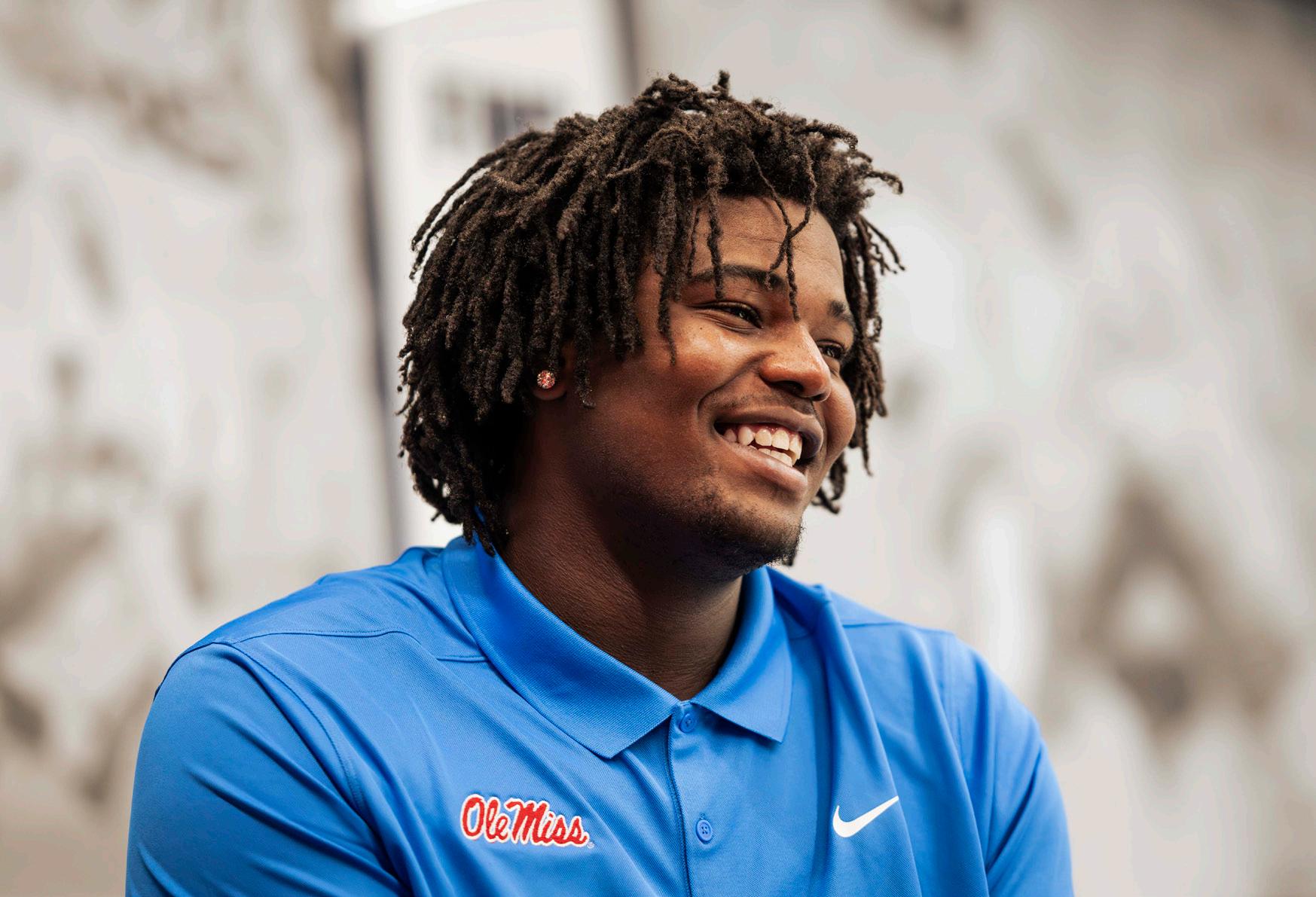
Zxavian Harris smiles during an interview in the Manning Center on Oct. 1.
“At first, I was just using my natural strength,” Harris said. “Now I know how to use it. Mix in a little finesse, dip the shoulder, slip through the gap. People don’t expect a big dude like me to move like that.”
Harris’s impact extends beyond the field. He has become a quiet leader in the locker room, guiding freshmen and transfers who might be struggling to find their place.
“I just tell them, keep your head down and keep working,” Harris said. “Especially the young D-line guys, they come in thinking they’re starting right away, but that’s not how it goes. You earn it.”
Harris has come to embrace the grind. His years spent mastering the playbook and working on his execution on the field have come to define this season’s grit -
ty Rebel defense. How would he describe his work ethic? “Blue collar,” Harris said. “Someone who just kept going, even when it got tough. That’s all I want people to say, ‘He worked his ass off.’”
ALANA AKIL Sports Staff Writer
RUSS
EDDINS
Sports Editor
Current NCAA rules grant student-athletes in good academic standing four seasons of eligibility over a five-calendar year period. However, student-athletes have recently turned to the courts in search of a fifth year of eligibility.
A fifth year can lead to positive impacts for many student-athletes, including ones at Ole Miss — such as Tyler Banks, who is in his fourth year of eligibility. An additional year means more opportunities to profit from Name, Image and Likeness deals and more time to develop as players and increase draft stock.
The NCAA has been considering adding a fifth year since September 2024. Now, with extensive pressure from various lawsuits, the addition of a fifth year of eligibility is a real possibility in the near future.
The NCAA proposed a “5-in5” rule, which would grant student-athletes the ability to play five seasons in five years; however, that will likely be delayed because a timeline has not been established.
“The thing about it is you hear something different every week,” Nebraska Men’s Basketball head coach Fred Hoiberg said according to CBS Sports. “The last we heard, it’s probably not going to happen this year, but it may happen in the future.”
Because of this uncertainty, coaches have to plan future roster construction without knowing whether their seniors can return.
According to current rules, football players who log snaps in four games or less in a season are eligible to redshirt, which means that season is not counted toward their four years of eligibility. Wrestling student-athletes can compete in up to five events and maintain their eligibility. However, those rules are unique to those two sports and do not apply to other NCAA sports.
Several student athletes have filed lawsuits against the NCAA in hopes of gaining another year of
eligibility. Some of the most prominent are Fourqurean v. NCAA, Elad v. NCAA and Zeigler v. NCAA.
In the most recent case, Patterson v. NCAA, Vanderbilt football players Langston Patterson, Issa Ouattara and 10 other plaintiffs filed a class-action lawsuit in September against the NCAA to extend student-athletes’ eligibility to five years.
“We’re not challenging the five year (limit),” co-lead attorney on Patterson v. NCAA Ryan Downtown said in a statement. “The question is, why do players have to spend one of those five years sitting on the bench? How does that further any of the NCAA’s goal of moving players toward graduation?”
The NCAA stated that it is standing firm on the rules.
“The NCAA stands by its eligibility rules, including the five-year rule, which enable student-athletes to access the life-changing opportunity to be a student-athlete,” an NCAA spokesperson said in a statement. “The NCAA is making changes to modernize college sports, but attempts to dismantle widely supported academic requirements can only be addressed by partnering with Congress.”
In Fourqurean v. NCAA, former Wisconsin football player Nyzier Fourqurean requested an immediate injunctive relief, a court-ordered remedy that forces a party to do, or stop doing, a specific action, in January 2025. This would have prevented the NCAA from enforcing the five-year rule. Fourqurean cited his time as a Division II player should not count toward his Division I eligibility.
The district court approved his injunction; however, it was overturned by the 7th U.S. Circuit Court of Appeals. The court found that “Fourqurean had not met the evidentiary burden required for preliminary injunction, as he had not shown sufficient evidence of anticompetitive effects on a relevant market.”
That case is ongoing, and Fourqurean is still seeking a preliminary injunction in a different court.
Similarly, in Elad v. NCAA, Jett Elad, a current Rutgers football player, is seeking an

additional year of eligibility. He is challenging the NCAA five-year rule that counts time spent at junior colleges against student-athletes’ eligibility.
In Zeigler v. NCAA, Tennessee basketball player Zakai Zeigler argued that, because student-athletes are allowed to be on campus for five years, they should be granted five seasons of eligibility. However, the court denied his preliminary injunction.
Zeigler planned on appealing the denial, but he recently dismissed the appeal before it was filed.
All of these lawsuits follow in the footsteps of Pavia v. NCAA. A year ago, Vanderbilt quarterback Diego Pavia sued the NCAA for reducing the number of seasons that junior college players can compete at the DI level. The judge ruled that he should be allowed to play this season, and Pavia is currently in his sixth year of college football. Now, the discussion on the limits of eligibility is in full swing.


HOW TO PLAY
Complete the grid so that every row, column and 3x3 box contains the numbers 1 through 9 with no repeats.
“A focus on vaccinating our university community without charge would provide innumerable benefits to its function and also dismantle a common barrier to health care in our state: cost.”
LOGAN DURLEY Opinion Staff Writer
Peak flu season is right around the corner, as made apparent by the growing number of mid-lecture coughs sounding throughout auditoriums and classrooms across campus. Each cough expels thousands of microbes that ricochet across closed spaces and into the respiratory tracts of vulnerable students.
To combat the severity of the flu, a disease that kills an estimated 6,300 - 52,000 people each year, the CDC recommends the seasonal flu shot. Research shows that the flu shot can significantly reduce the impact of influenza on infected persons and greatly alleviate the burden on our health care system that flu season causes.
Over the past few weeks, there have been multiple opportunities for students to receive the flu shot on campus, at pop-up tables in locations such as the Grove Stage and the Circle. At these tables, the shot is offered free with insurance, at your insurance’s
co-pay or, if neither of those work, $40 will be charged to your bursar account.
These efforts are certainly commendable, but they’re not complete. Current initiatives could be expanded to offer a greater front against the coming flu season by eliminating the cost barrier to treatment.
The potential answer? A university-led campaign to offer flu shots free to all students, staff and family of staff, with the potential to dampen the effects of the upcoming flu season and lighten the load on our local health care providers.
Vaccinating our university community without charge not only would act as a boost to the campus immune system as a whole, but also would dismantle a common barrier to health care in our state: cost.
Approximately 1-in-10 college students lack health care in the United States, a number likely to increase as slashes to Medicaid, part of President Donald Trump’s One Big Beautiful Bill, are set to take effect. Historically disadvantaged students comprise the majority of those
uninsured and are expected to bear the brunt of our government’s reckless spending cuts.
The university has a golden opportunity to reaffirm its commitment to its students and community in offering free flu shots. Also, having a greater share of the student population vaccinated against the flu has the potential to improve functionality of the university and quality of life for our Oxford-Lafayette community.
Decreasing the instances of flu infections could increase student class attendance, potentially raising grades and the benchmark of academic performance here at the UM. With fewer students out with the flu, less unnecessary stress is placed on the shoulders of both students and faculty.
Schools act as epicenters of disease outbreaks, and any available precaution should be taken for the sake of public health. Minimizing communicable disease instances in emergence hotspots, such as our campus, would offer significant reprieve to local health care providers and allow them to focus
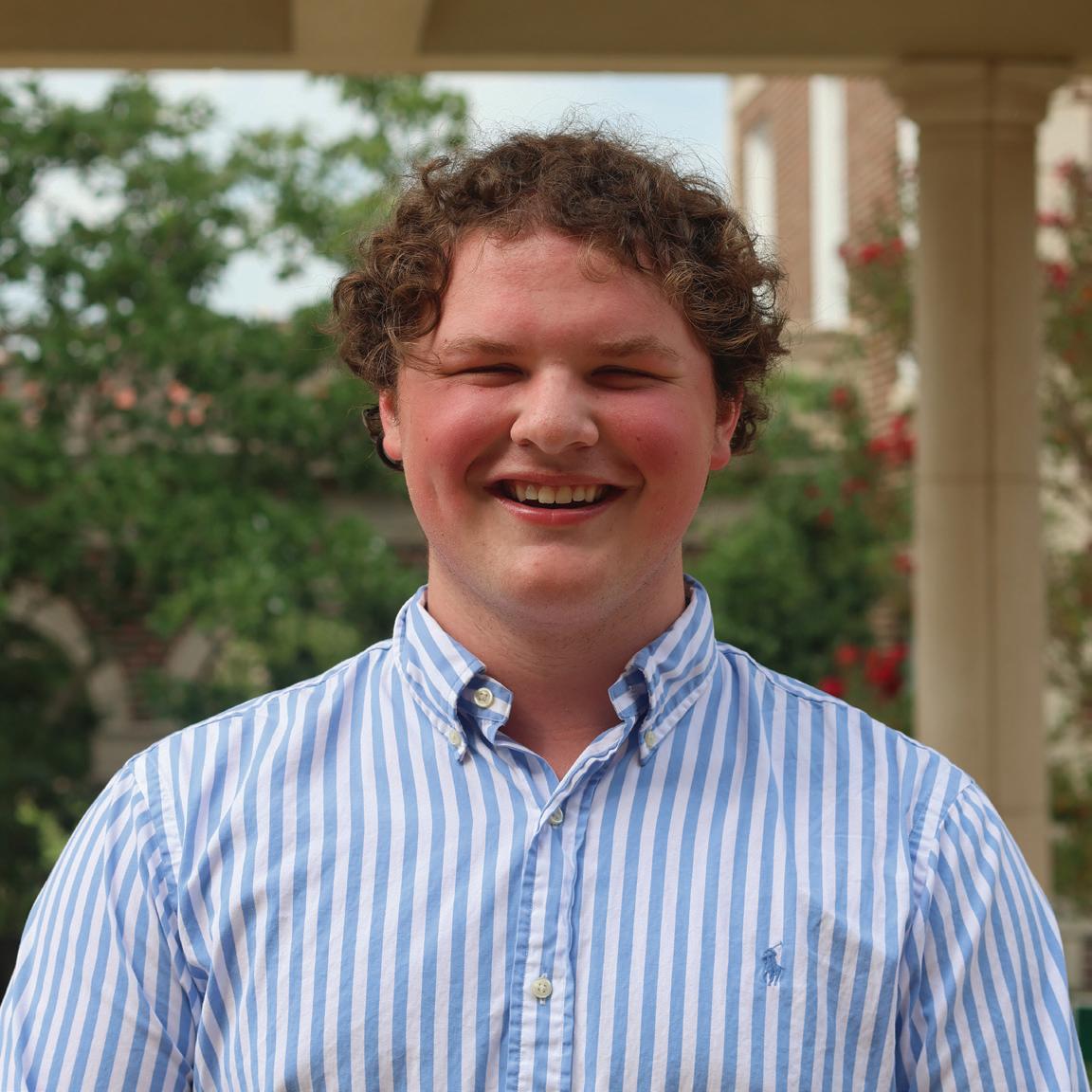
heavier on other ailments.
Assuming responsibility for flu vaccinations would not be a frivolous expense on behalf of the university — it would be a wise investment in the efficacy and health of our campus, city and community.
CONTACT THE OPINION DESK AT thedmopinion@gmail.com
“As with any technology, troubleshooting errors are inevitable. Research reveals the harshness of AI evaluation and human evaluation often differs. Look at GPT-4o’s assessment essays — on average, AI-evaluated scores were 0.9 points below human-evaluated scores and only matched 30% of the time.”
ELLA SNYDER
Opinion Staff Writer
As artificial intelligence algorithms continue to advance, views on ethical usage of such programs are undergoing their own evolution. In the educational context, most critiques center around the student experience. Ethical use by faculty, however, is typically less discussed. Universities must ask themselves this: How can one healthily use AI without becoming fully reliant on it? As algorithms adapt, assigning seemingly menial tasks to language learning models (LLMs) is becoming even more convenient. Why spend the time poring through dozens of essays when AI does it in just over a nanosecond? Naturally, the academic profession obligates
the time-consuming review of tests, papers and even daily assessments. Perhaps its use can free up more time that professors can dedicate to ensuring each and every student succeeds in the classroom.
As with any technology, troubleshooting errors are inevitable. Research reveals the harshness of AI evaluation and human evaluation often differ. Look at GPT-4o’s assessment essays — on average, AI-evaluated scores were 0.9 points below human-evaluated scores, and only matched 30% of the time, according to a 2024 study from the University of Gothenburg. This might be attributable in part to AI’s inability to discern good and bad writing. In fact, human graders passed out more A’s and F’s, whereas AI passed out more C’s. The impact? Qual -
ity writing gets less recognition and sub-par performance gets lenient critiques.
If AI evaluation is not supplemented by professor analysis, more students might falsely believe that they have met professors’ expectations. The numerical difference between the professor’s and AI’s grading might be small, but it makes a difference. Instructors relying exclusively on AI creates graduates less equipped to earn a degree.
Despite AI’s humanless nature, it is no less susceptible to biases toward people of various minority groups. AI algorithms emulate human-influenced datasets, leading to computer assessments that reflect human prejudices. In a world where attacks on basic diversity programs and institutional barriers to minority student success hinder
an equal playing field, faculty must commit to ensuring AI tools evaluate meritocratically.
Matthew Murray from the University of Mississippi’s Department of Sociology and Anthropology weighed in on faculty use.
“I don’t have anything against it directly, unless the AI simply imitates what it thinks you want, which is self-defeating and dangerous,” he said while elaborating on its ability to provide new perspectives.
Murray commented on Blackboard’s recently available AI tools, mentioning that “the new version of Blackboard has what seems to me to be very good AI tools for course development,” including but not limited to AI-generated quizzes, assignments and rubrics based on course materials.
Ella Snyder is a sophomore creative writing major from Oxford, Miss.
On said tools, Murray reflected that “I have been lightly trained in them, but I have not used them.” If faculty does choose to employ AI tools alongside traditional pedagogy, the university needs to adapt accordingly. Departments should implement required AI-use training, minimizing the potential negatives of AI tools while maximizing productive benefits. As students face accountability for their AI usage, educators must ensure they are using it to enhance the learning experience. Computers might be quick, but teachers are the true building blocks to education.
and libel. Third-party letters and those with pseudonyms or no name will not be published. Letters are limited to one per individual per month. Letters should include contact information, including relationship to the university, if applicable.



